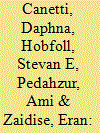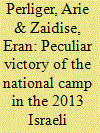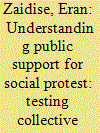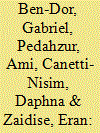|
|
|
Sort Order |
|
|
|
Items / Page
|
|
|
|
|
|
|
| Srl | Item |
| 1 |
ID:
185269


|
|
|
| 2 |
ID:
100393


|
|
|
|
|
| Publication |
2010.
|
| Summary/Abstract |
The association between religion and violence has raised much interest in both academic and public circles. Yet on the individual level, existing empirical accounts are both sparse and conflicting. Based on previous research which found that religion plays a role in the support of political violence only through the mediation of objective and perceived deprivations, the authors test Conservation of Resource (COR) theory as an individual level explanation for the association of religion, socio-economic deprivations, and support for political violence. COR theory predicts that when individuals' personal, social or economic resources are threatened, a response mechanism may include violence. Utilizing two distinct datasets, and relying on structural equation models analysis, the latter two stages of a three-stage study are reported here. In a follow-up to their previous article, the authors refine the use of socio-economic variables in examining the effects of deprivation as mediating between religion and political violence. Then, they analyze an independent sample of 545 Muslims and Jews, collected during August and September 2004, to test a psychological-based explanation based on COR theory. This study replaces measures of deprivation used in the previous stages with measures of economic and psychological resource loss. Findings show that the relationship between religion and support of political violence only holds true when mediated by deprivations and psychological resource loss. They also suggest that the typical tendency to focus on economic resource loss is over-simplistic as psychological, not economic, resources seem to mediate between religion and support of violence.
|
|
|
|
|
|
|
|
|
|
|
|
|
|
|
|
| 3 |
ID:
137545


|
|
|
|
|
| Summary/Abstract |
This article argues that attempts to characterize the outcome of the elections to the 19th Knesset as a defeat of the Israeli right are misleading. By using a three-dimensional analysis of the ideological makeup of the Knesset, based on the ideological manifestos of the parties, the socio-demographic profiles of Knesset members and analyses of election results utilizing electoral data and socio-demographic data obtained from Israel's Central Bureau of Statistics (CBS), the article claims that the 19th Knesset is no less right-leaning than its predecessor. Hence, contrary to some commentators in both the media and academia, the 2013 elections represent a true landmark for the settlers. For the first time since the movement appeared in the 1970s, it managed to obtain a solid base in the Knesset.
|
|
|
|
|
|
|
|
|
|
|
|
|
|
|
|
| 4 |
ID:
161389


|
|
|
|
|
| Summary/Abstract |
Despite its acclaimed role in democratic theory, social protest is not a common occurrence in most states where widespread political participation is typically limited to voting, and mass participation is otherwise rare. This article examines public opinion regarding the 2011 summer protests in Israel, in which hundreds of thousands took to the streets in wide-scale events that lasted for several weeks. It does so by focusing on two independent samples, one of university undergraduate students and the other of active protesters, totaling 59 respondents. Findings suggest that support for the protest most strongly affiliated with concerns of social injustice coupled with the belief that government responsible for this state of affairs.
|
|
|
|
|
|
|
|
|
|
|
|
|
|
|
|
| 5 |
ID:
082695


|
|
|
|
|
| Publication |
2008.
|
| Summary/Abstract |
This study examines conditions of peace and war to find whether the "rally `round the flag" effect is indeed attributed to rising levels of social collectivism. Reserve service motivation in peacetime and wartime was compared among 1,004 Israeli reservists. Levels of motivation and the factors that affect them were examined during the optimism of the Israeli-Palestinian peace process (February 2000) and about a year and a half into the second Intifada (October 2000). Findings suggest that motivation to serve in wartime is indeed higher than in peacetime. However, they also suggest that similar factors predict motivation in both times, although their relative impact is altered by the situation. Reservists were more likely to be motivated by individual rather than collective incentives (in both peacetime and wartime situations), thus suggesting that "rally `round the flag" occurrences are not necessarily reflective of the social cohesion and collective reasoning.
|
|
|
|
|
|
|
|
|
|
|
|
|
|
|
|
|
|
|
|
|